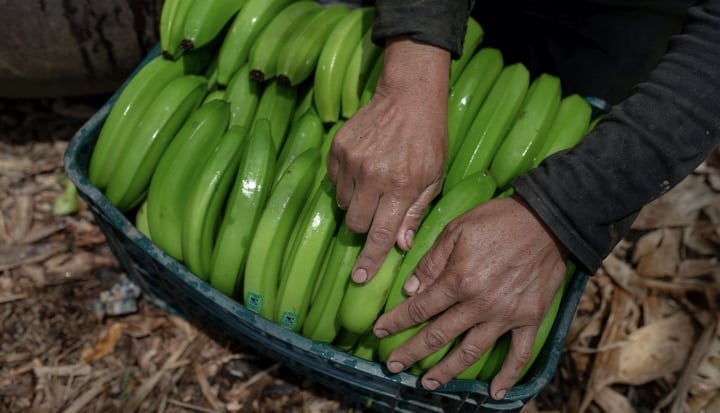This year’s Business Fights Poverty Global Summit is warning of the tsunami of poverty created by COVID-19, climate change and conflict that our community is striving to resist. For the people working in global supply chains, in agriculture, fashion, extractive industries in low-income countries, and who often experience entrenched social inequality, crisis is all too common. Sadly they’ve been there time and time again.
Take banana farmers. As Marike de Peña, banana producer and Chair of the Latin America and Caribbean Network of Fairtrade Banana Producers, wrote earlier this year: “For more than 450 million people around the world, bananas and plantains are vital staple crops. But amid spiking production costs for packing materials and fertilizers combined with the economic fallout of climate change, COVID-19, and the fight against plant diseases like Fusarium TR4, banana producers are coming under increasing financial pressure, placing their livelihoods, sustainable farming practices, and food security at risk.” You can also meet Roberto, a Fairtrade Peruvian banana farmer, and hear his perspective on the price crisis in his own words in the documentary Farmers: Fighting the Global Crisis.
During the events this week we’ll all be sharing insights to uncover solutions to these urgent problems. At Fairtrade we have established robust research, monitoring and learning processes to better understand how the 1.9 million farmers and workers we represent are doing, and what more is needed.
New study shows benefits of Fairtrade in buffering farmers during times of crisis
New research published on Friday 10 June 2022 reveals that farmers who are part of Fairtrade certified producer organizations are more resilient in the face of crisis. The report, entitled Assessing the Impact of Fairtrade on Poverty Reduction and Economic Resilience through Rural Development finds that Fairtrade Standards, Fairtrade pricing, and producer support programmes positively impact certified farmers and their communities when compared to non-Fairtrade certified farmers. This is the third such study conducted over the past decade for Fairtrade, in which researchers visited the same Fairtrade certified producer organizations in Ghana (cocoa) and Peru (coffee and bananas) to look at key sustainability dimensions and gain valuable insights into the changing conditions and perspectives of Fairtrade farmers.
Mainlevel Consulting, the research consultancy that conducted the study, found that in addition to the benefits being part of stronger, well governed organisations, two Fairtrade mechanisms, the Minimum Price and the Premium, represent a crucial safety net for farmers and their communities.
The research finds improvements in the financial situations of the participating households, such as increased earnings, stronger safety nets, and boosted savings. In one specific instance, coffee farmer members of the Fairtrade certified La Florida cooperative in Peru reported earning incomes 50 percent higher than those of non-Fairtrade farmers.
According to the report, Fairtrade’s positive impact on certified farmers goes beyond economic resilience. Being part of democratic and transparent decision-making organisations is important too and makes sustainability possible, as cooperatives take responsibility for making and carrying out decisions related to environmental, social, and economic spheres.
Fairtrade farmers also registered an uptick in benefits across social well-being indicators, including gender equality and workplace safety and health, when compared with their non-Fairtrade counterparts. Women in the Fairtrade cocoa cooperative in Ghana, for instance, showed more confidence in speaking up and voicing their thoughts. Farmers in one focus group discussion with this cooperative made clear that the decision-making power for women members had improved over the last four years. Similar advantages were noted on health-related issues. The more well-established banana cooperatives, for instance, used their Fairtrade Premium funds to provide health services and trainings, including on COVID-19 safety measures.
Three global challenges continue to threaten farmer livelihoods and rural communities
At the same time, the researchers also identified significant challenges that risk undermining the gains Fairtrade farmers have achieved and which threaten their livelihoods. Indeed, increasing pressure from the “grim reality” of the triple global calamities of climate change, COVID-19 and higher costs of living and farming mean that greater external financial support is needed, especially where farmers have lost sales or experience greater costs exporting their produce. Furthermore, fresh foods like bananas cannot be stored for a rainy day if orders are cancelled or supply chain problems cause containers to be left in ports, the fruit rots and farmers can be hit very hard. Read more about the problems facing banana farmers.
The study sets out a number of recommendations for businesses and other stakeholders, including to fund climate change adaptation measures, pay higher prices to farmers, and support other measures to improve farmers’ incomes and resilience.
These are urgent measures. Ultimately, as we all come together this week we call on everyone within supply chains to take concrete steps to increase their responsibilities. If real action is taken, we can protect hard-won sustainability gains and stability for those in global supply chains who are most at risk.
Download the report Assessing the Impact of Fairtrade on Poverty Reduction and Economic Resilience through Rural Development.










